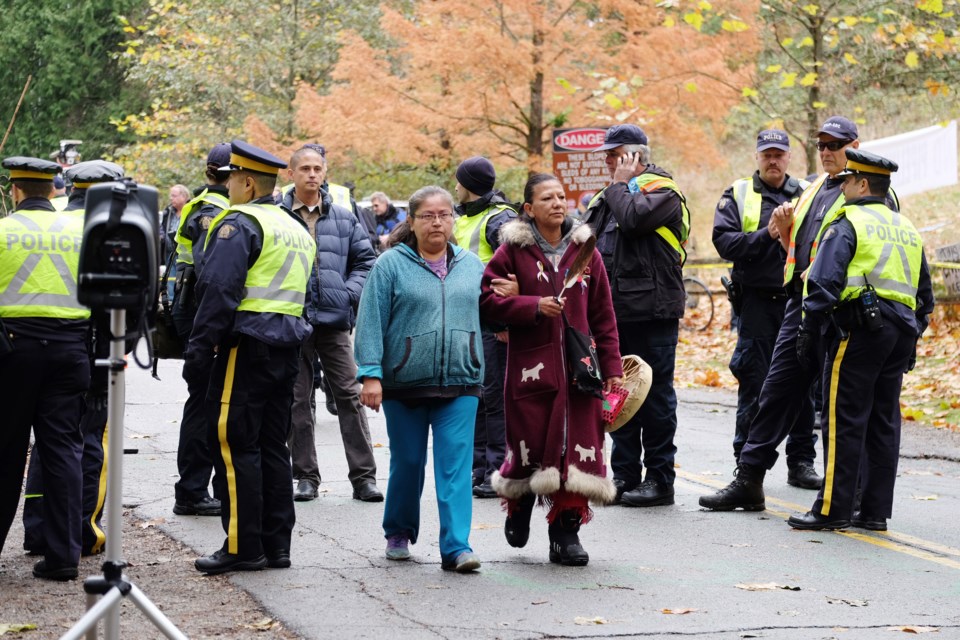Some Squamish Nation members are questioning whether the major decisions chiefs and council have been making follow the Nation’s due process.
Beverly Brown, an outspoken critic of the Nation’s leadership, has been most upset about the Woodfibre LNG project and most recent associated proposed FortisBC natural gas pipeline expansion.
“It is very much like the Woodfibre deal. They didn’t have any mandate to do this. They didn’t get the mandate from the people. They didn’t provide all members with proper project information, or a vote,” Brown said, adding only council voted on whether to conditionally support the proposed FortisBC Eagle Mountain – Woodfibre Gas Pipeline Project.
Brown said several other members feel the way she does, but don’t want to speak publically against their leadership.
“There’s always a lot of comments in the community, but a lot of them don’t want to make comments publicly because they are afraid of council,” she said. “For me, I don’t live on reserve so I’ve got nothing to lose. It makes it easier.”
Squamish Nation spokesperson and councillor Chris Lewis said Nation leadership is “acutely aware” members have strong opinions on the proposals.
“Both have the potential to be game changers, and we must get them right, conducting our own independent environmental assessment for example. At the same time, Squamish Nation government operates as a democracy like any other,” he said in an email to The Chief. “That is precisely the reason we conducted a comprehensive program of public consultation with our members. We reached out and asked for, and received, members’ input in a series of meetings held over the past 18 months. Afterwards, this information was collected and collated before it was presented to Squamish Nation Council for careful review.”
Brown argues there wasn’t consultation, but instead information meetings where the will of the people wasn’t considered.
“They move ahead anyhow,” she said.
In the past, decisions were more collaborative and documents related to major decisions were more accessible, according to Brown.
“All membership was included,” she said.
Brown cites the Kitsilano court action that was resolved in 2002, when
the court upheld a lower court decision to restore former Kitsilano Indian Reserve lands to the Squamish Nation’s reserve lands.
“That came to the people,” she said. “We got proper project information from council and from the government – it is a requirement.”
Brown said the membership gave the council of the day the mandate at a general meeting to follow through with the court case, as is custom, she said.
“They come to us and say, ‘We are thinking of doing this… do you think you are interested in doing this?’ and membership says yes or no.”
Fellow Squamish Nation member Clarissa Antone is also opposed to how council has handled the Woodfibre and FortisBC liquefied natural gas proposals.
“I am totally against the LNG [project],” she said, adding she attends all the Nation’s meetings on Wednesdays.
“Basically, they are jeopardizing our own families and children,” she said.
Antone is no stranger to standing up for what she feels is right. She was on the frontlines of protests on Burnaby Mountain against the proposed Kinder Morgan Pipeline.
She noted that while the Nation has publicly opposed Kinder Morgan’s project to the point of last month challenging the National Energy Board’s recommendation of support in the Federal Court of Appeal.
“So how can you be against Kinder Morgan and be saying yes to the LNG project,” Antone said.
Lewis said the differences between Kinder Morgan and Woodfibre LNG are both project and process related.
“Kinder Morgan is producing a product that is environmentally unacceptable to the Squamish Nation as heavy oil has the potential to severely impact on our lands and resources and way of life. It has not been proven to us that diluted bitumen can be cleaned up if there is a spill. Oil also has impacts on our environment globally as it continues to pollute air and contributes in a major way to climate change,” he said.
“LNG, on the other hand, dissipates if there is a leak in the pipeline or breach of the ship and cleanup is not an issue.
It also contributes to lowering greenhouse gas issues as compared to oil.”
Lewis added, in terms of process, the LNG project was assessed through a Squamish Nation environmental assessment while the Kinder Morgan project “underwent a flawed federal assessment process that did not allow the Squamish Nation any meaningful input into whether the project should be approved or not.”
Antone echoed Brown’s assertion that custom dictates a referendum should be held on major decisions.
Like Brown, Antone said she isn’t alone in her opposition.
“Other members say to me, ‘We’re so glad you can speak up, that you can say these things because we are too afraid.’” Antone said.




